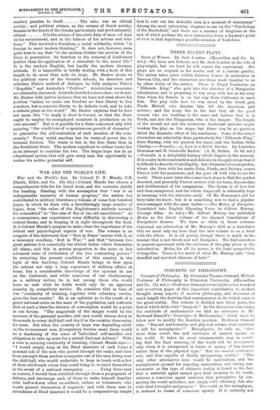THREE RECENT PLAYS.
Scorn of Women. By Jack London. (Macmillan and Co. 5s. net.)—We have not hitherto met Mr. Jack London in the role of playwright, but we trust he will repeat the experiment. His plays are as original as his novels, and of a similar quality. The action takes place within thirteen homes in midwinter at Dawson City, and the characters are those made familiar to us by other works of the author. There is Floyd Vanderlip, an " Eldorado King," who gets into the clutches of a Hungarian adventuress, and is preparing to run away with her at the very time when his fiancée is on her way from California to inset him. The play tells how ho was saved by the Greek girl, Freda Moloof, who detains him till the American girl arrives ; and the irony lies in the fact that all the good women who are working to the same end believe that it is Freda, and not the Hungarian, who is the danger. The length of the second act and the numerous irrelevant episodes might weaken the play on the stage, but there can be no question about the dramatic effect of the conclusion. Some of the minor characters are admirably done, particularly the" Eldorado King," Dave Harnay, with his passion for sugar, and the Indian, Sitka Charley.—Prunella ; or, Love in a Dutch Garden. By Laurence Housman and H. Granville Barker. (A. H. Bullen. 3s. 6d. net.) —Prunella is a delightful fantasy which lingers in the memory. It is so airy in its construction and delicate in its application that it is difficult to describe it intelligibly. Into Prunella's formal garden, where she lives with her aunts Prim, Prude, and Privacy, comes Pierrot with his mummers, and she goes off with him to see the world. Three years later she comes back alone to find the garden deserted, and presently Pierrot arrives with his train, disconsolate and disillusioned of his companions. Tho theme is of love lost and then recaptured, and the whole stagecraft is admirably kept in harmony with the fantastic motif. Of Mr. Housman's gift for fairy-tales we knew; but it is something new to find a popular actor-manager with the same tastes.—The Medea of Euripides. Translated into English Rhyming Verse by Gilbert Murray. (George Allen. 2s. net.)—Mr. Gilbert Murray has published Medea as the latest volume of his rhymed translations of Euripides's dramas. We have so often in these columns expressed our admiration of Mr. Murray's skill as a translator that we need only say here that the new volume is on a level with the others. It is all poetry, though there is much in tho manner that is not Greek and not Euripides. We find ourselves in general agreement with the criticism of the play given in the introduction. Medea, for all its power, is the least sympathetic of tragedies. There is too much of what Mr. Murray calls " that dreadful and insistent clamour of hate."






























































 Previous page
Previous page